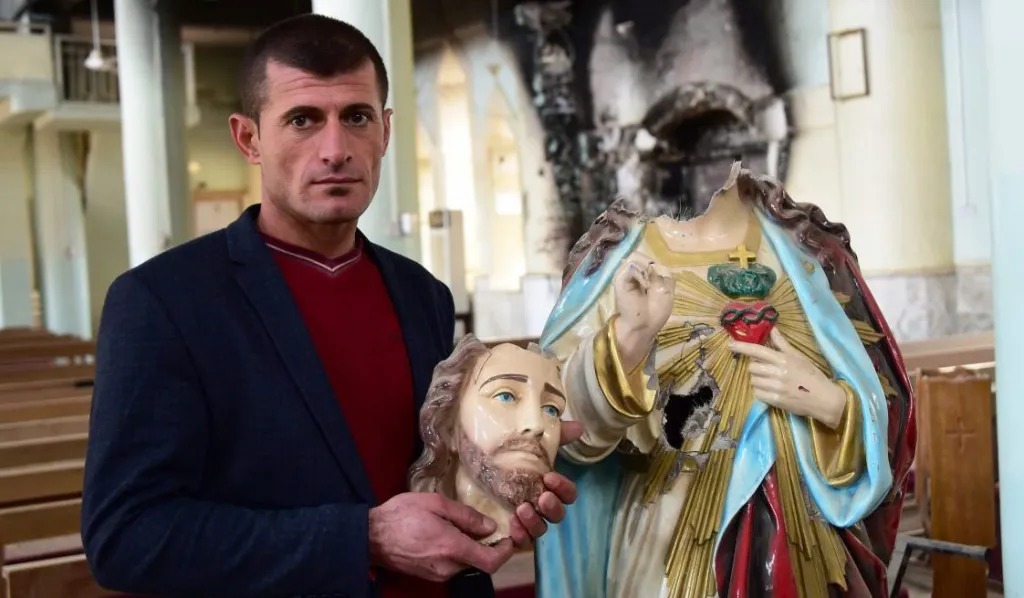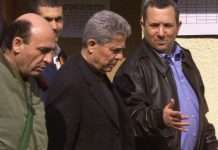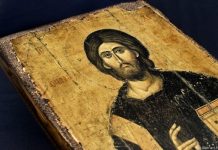اليوم الأسود للمسيحيين في العراق الذي لا ينتهي
رايموند إبراهيم/موقع بي جي ميديا/7 أغسطس/آب 2024
(ترجمة من الإنكليزية بواسطة موقع غوغل)
Iraqi Christians’ Never-Ending ‘Black Day’
Raymond Ibrahim/PJ Media/August 07/2024
Yesterday, on Aug. 6, the Christians of Iraq commemorated the tenth anniversary of “The Black Day” — when the Islamic State of Iraq and Syria (ISIS) invaded northern Iraq, where most of that nation’s Christian minorities live(d), beginning on Aug. 6, 2014.
The atrocities then committed — and which were correctly labeled genocide by the international community — were unimaginable: I personally remember going through and still have access to numerous reports, many in non-English languages, on how ISIS butchered, crucified, enslaved, raped, bought, and sold Christians as if they were chattel — not to mention the bombing or burning of countless, often ancient heritage-site churches and monasteries.
Incidentally, and striking closer to home, it should be remembered that one of the main reasons that an otherwise small band of terrorists was able to conquer the large Christian populations of Northern Iraq is because the latter were disarmed by their government and thus unable to fight back. As John Zmirak of The Stream wrote,
[Iraq’s Christians were] kept disarmed, politically powerless, but physically safe by a regime that valued its credentials as religiously tolerant. The U.S. invasion in 2003 destroyed the regime of Saddam Hussein, dissolved the Baathist party, and unleashed the long-simmering forces of inter-religious hatred… The one group which all the others saw no reason to protect, and which many scapegoated for the invasion by U.S. “crusaders,” were the helpless local Christians.
Be that as it may, and as fitting as it is to remember the “Black Day” that unleashed ISIS on the Christians of Northern Iraq, it is equally important to remember that the plight of Iraq’s Christians — one of the oldest Christian communities in the world — began well before the advent of ISIS and continues to the present moment. In other words, ISIS was always only the icing on the jihadist cake, one which continues to be dished out to Christians, even if in smaller slices.
Everything went downhill for Iraq’s Christians following the U.S. invasion of Iraq in 2003 and subsequent toppling of Saddam Hussein. Whatever his faults, Saddam was a secularist — meaning that his internal enemies were the same enemies of Christians: observant (“radical”) Muslims who, just as they disliked Christian “infidels,” also disliked and sought to overthrow Saddam for not being a “true” Muslim — for being an apostate as they had long characterized him. As such, he kept them suppressed, which indirectly benefited Christians.
As one leading Vatican official once put it, Christians, “paradoxically, were more protected under the dictatorship [of Saddam Hussein].”
Once he was toppled, the genie — or jihadi — bottle was uncorked: “militant” Muslims everywhere — many of them presented by the mainstream media as U.S. allies and “freedom fighters” — began to exercise sharia (as they later did in Libya, Yemen, Egypt, and Syria under the Obama-sponsored guise of an “Arab Spring”).
Here, for example, is a telling excerpt from an article I wrote in April 2011 — three years before ISIS even existed and had not yet caused the “Black Day”:
Last week an Iraqi Muslim scholar issued a fatwa that, among other barbarities, asserts that “it is permissible to spill the blood of Iraqi Christians.” Inciting as the fatwa is, it is also redundant. While last October’s Baghdad church attack which killed some sixty Christians is widely known … the fact is, Christian life in Iraq has been a living hell ever since U.S. forces ousted the late Saddam Hussein in 2003…. Among other atrocities, beheading and crucifying Christians are not irregular occurrences; messages saying “you Christian dogs, leave or die,” are typical. Islamists see the church as an “obscene nest of pagans” and threaten to “exterminate Iraqi Christians.”
Again, keep in mind that the Muslims doing this were not yet ISIS, as ISIS would not even become an entity till 2013. They were just “militant” Muslims who hated Christians for the same reason their ancestors hated and ruthlessly subjugated Christians: Islam, which exploits innate tribalism, makes a detested enemy of the “other” — in this case, the non-Muslim, the infidel, who is to be abused, plundered, and slaughtered at will.
That the real issue was an uncorked Islam, as opposed to an organization called ISIS, is further apparent in the fact that, long after ISIS has been gone, Christians continue to suffer persecution and discrimination — at the hands of regular Iraqi citizens and even the U.S.-installed government no less.
Since late 2017, when ISIS was officially defeated in Iraq, Christians have continued to be physically attacked, including with knives; Christian shops have been firebombed; Christian churches invaded; Christian lands burned, and Christian homes illegally seized — always with the Iraqi government looking the other way.
None of this should be surprising: mainstream Iraqi clerics — Sunnis and Shias, neither “radicals” — continue to spew hate for infidels from their minbars. One Muslim leader on the government’s pay described Christians as “infidels and polytheists,” stressing the need for “jihad” against them.
Discussing Islam’s correct approach to non-Muslims, the Grand Ayatollah Ahmad al-Baghdadi, Iraq’s top cleric, even went so far as to say on live television:
If they are people of the book [Jews and Christians] we demand of them the jizya—and if they refuse, then we fight them. That is if he is Christian. He has three choices: either convert to Islam, or, if he refuses and wishes to remain Christian, then pay the jizya [and live according to dhimmi rules]. But if they still refuse—then we fight them, and we abduct their women, and destroy their churches—this is Islam!
In a Dec. 30, 2022, interview, Louis Raphaël I Sako, the Chaldean Catholic Patriarch of Babylon, discussed the continuing plight of Christians in post-ISIS Iraq. After saying that Christian minors continue to be pressured to convert to Islam and that sharia is being imposed on Christians, he added:
The [Iraqi] constitution talks about freedom of conscience, but it is just on paper. This mentality and these practices—all this inherited tradition—must end. The world has become a global village. Just look at the Muslims abroad. When I visit abroad and meet with heads of state, I see that the Muslims there have the same rights as the Christians and atheists. Here, however, I am treated as a second-class citizen.
Almost as if to prove him right, the most recent form of Iraqi persecution comes directly from Abdul Latif Rashid, the president of Iraq, and is directed against the Chaldean Patriarch himself. According to a 2023 report, “Under mounting pressure from a pro-Iran militia group, the Iraqi president earlier this month revoked a decade-old decree that formally recognized Chaldean Patriarch Cardinal Louis Raphael Sako and granted him powers over Christian endowment affairs.”
Christians are convinced that this move was meant to facilitate the further confiscation of their property, which began under ISIS. In the words of Diya Butrus Slewa, a human rights activist from Ainkawa, “This is a political maneuver to seize the remainder of what Christians have left in Iraq and Baghdad and to expel them. Unfortunately, this is a blatant targeting of the Christians and a threat to their rights.”
Other Christians gathered in peaceful protests, holding up “placards telling the Iraqi government that they had committed ‘enough injustice’ against the long-suffering Christian community.” Another sign read:
Mr. President, the protector of the constitution should not violate the constitution. The Iraqi president orders the displacement of Christians, and opens the way for violating the property of the Chaldean Church which represents nearly 80 percent of Christians in Iraq and Kurdistan.
In short, Iraq’s Christians have gone from having ISIS, a terrorist organization, persecute them, to the U.S.-sponsored president of Iraq persecuting them, if in an admittedly less sensationalist form (hence why zero coverage from the “mainstream media”).
This should make clear that ISIS was never the cause, but rather an overt symptom of the persecution of Christians in Iraq and the broader Middle East. The true cause — Islamic hostility and contempt for “infidels” — remains alive and well, not least because it must never be named or acknowledged.
And so, although it began ten years ago yesterday, Iraq’s Christians continue to live under a “Black Day” — one that has not seen a sunrise for a decade.
https://pjmedia.com/raymond-ibrahim/2024/08/07/iraqi-christians-never-ending-black-day-n4931416
اليوم الأسود للمسيحيين في العراق الذي لا ينتهي
رايموند إبراهيم/موقع بي جي ميديا/7 أغسطس/آب 2024
(ترجمة من الإنكليزية بواسطة موقع غوغل)
أمس، في السادس من أغسطس/آب، أحيى المسيحيون في العراق الذكرى السنوية العاشرة لـ”اليوم الأسود” – عندما غزا تنظيم الدولة الإسلامية في العراق والشام (داعش) شمال العراق، حيث تعيش أغلب الأقليات المسيحية في تلك الأمة، بدءًا من السادس من أغسطس/آب 2014.
كانت الفظائع التي ارتكبت آنذاك – والتي وصفها المجتمع الدولي بشكل صحيح بأنها إبادة جماعية – لا يمكن تصورها: أتذكر شخصيًا أنني قرأت ولا زلت أستطيع الوصول إلى العديد من التقارير، وكثير منها بلغات غير الإنجليزية، حول كيف ذبح داعش المسيحيين وصلبهم واستعبدهم واغتصبهم وباعهم كما لو كانوا منقولات – ناهيك عن قصف أو حرق عدد لا يحصى من الكنائس والأديرة التراثية القديمة في كثير من الأحيان.
وبالمناسبة، ومن المثير للاهتمام أن نتذكر أن أحد الأسباب الرئيسية التي جعلت عصابة صغيرة من الإرهابيين قادرة على قهر السكان المسيحيين في شمال العراق هو أن الحكومة نزعت سلاح المسيحيين وبالتالي لم يعد بوسعهم الرد. وكما كتب جون زميراك من صحيفة ذا ستريم:
[لقد ظل المسيحيون في العراق] منعزلين، عاجزين سياسياً، ولكن آمنين جسدياً من قبل نظام كان يقدر أوراق اعتماده باعتباره متسامحاً دينياً. لقد دمر الغزو الأميركي في عام 2003 نظام صدام حسين، وحل حزب البعث، وأطلق العنان لقوى الكراهية بين الأديان التي كانت تغلي منذ فترة طويلة… أما المجموعة الوحيدة التي لم ير الآخرون أي سبب لحمايتها، والتي اعتبرها كثيرون كبش فداء للغزو الذي شنته الولايات المتحدة على العراق، فكانت المسيحيين المحليين العاجزين.
ولكن مهما كان الأمر، ومهما كان من المناسب أن نتذكر “اليوم الأسود” الذي أطلق فيه تنظيم داعش العنان لمسيحيي شمال العراق، فمن المهم بنفس القدر أن نتذكر أن محنة مسيحيي العراق ــ أحد أقدم المجتمعات المسيحية في العالم ــ بدأت قبل ظهور تنظيم داعش بوقت طويل ولا تزال مستمرة حتى اللحظة الحالية. وبعبارة أخرى، كان تنظيم داعش مجرد الكريمة على كعكة الجهاديين، والتي لا تزال تُقدَّم للمسيحيين، ولو على شكل شرائح أصغر.
انحدرت الأمور بالنسبة لمسيحيي العراق في أعقاب الغزو الأميركي للعراق في عام 2003 والإطاحة بصدام حسين. فمهما كانت عيوبه، كان صدام علمانياً ــ وهذا يعني أن أعداءه الداخليين كانوا نفس أعداء المسيحيين: المسلمون الملتزمون (“المتطرفون”) الذين، كما كانوا يكرهون “الكفار” المسيحيين، كانوا يكرهون صدام ويسعون إلى الإطاحة به لأنه ليس مسلماً “حقيقياً” ــ لأنه مرتد كما وصفوه لفترة طويلة. وعلى هذا النحو، ظل يبقيهم تحت القمع، الأمر الذي أفاد المسيحيين بشكل غير مباشر.
ولكن في الواقع، فإن هذا لا يعني أن المسيحيين كانوا محميين بشكل أكبر في ظل الدكتاتورية [صدام حسين]، كما قال أحد كبار المسؤولين في الفاتيكان ذات يوم.
وبعد الإطاحة به، انفتحت زجاجة الجني ــ أو الجهاديين ــ فبدأ المسلمون “المتشددون” في كل مكان ــ وكثير منهم قدمتهم وسائل الإعلام الرئيسية باعتبارهم حلفاء للولايات المتحدة و”مقاتلين من أجل الحرية” ــ في ممارسة الشريعة (كما فعلوا في وقت لاحق في ليبيا واليمن ومصر وسوريا تحت ستار “الربيع العربي” الذي رعاه أوباما).
إليكم، على سبيل المثال، مقتطفاً معبراً من مقال كتبته في إبريل/نيسان 2011 ــ قبل ثلاث سنوات من وجود تنظيم الدولة الإسلامية وحتى قبل أن يتسبب بعد في “اليوم الأسود”:
في الأسبوع الماضي أصدر عالم مسلم عراقي فتوى تؤكد، من بين أعمال وحشية أخرى، على أنه “يجوز سفك دماء المسيحيين العراقيين”. ورغم أن الفتوى تحريضية، فإنها أيضاً زائدة عن الحاجة. في حين أن الهجوم على كنيسة بغداد في أكتوبر/تشرين الأول الماضي والذي أسفر عن مقتل نحو ستين مسيحياً معروف على نطاق واسع… فإن الحقيقة هي أن الحياة المسيحية في العراق كانت جحيماً حقيقياً منذ أطاحت القوات الأميركية بصدام حسين في عام 2003… ومن بين الفظائع الأخرى، فإن قطع رؤوس المسيحيين وصلبهم ليست حوادث غير عادية؛ فالرسائل التي تقول “أيها الكلاب المسيحيون، ارحلوا أو موتوا” هي نموذجية. ويرى الإسلاميون الكنيسة باعتبارها “عشاً قذراً للوثنيين” ويهددون “بإبادة المسيحيين العراقيين”. رة أخرى، ضع في اعتبارك أن المسلمين الذين فعلوا هذا لم يكونوا داعش بعد، حيث لم تصبح داعش كيانًا حتى عام 2013. كانوا مجرد مسلمين “متشددين” يكرهون المسيحيين لنفس السبب الذي جعل أسلافهم يكرهون المسيحيين ويخضعونهم بلا رحمة: الإسلام، الذي يستغل القبلية الفطرية، يجعل من “الآخر” عدوًا مكروهًا – في هذه الحالة، غير المسلم، الكافر، الذي يجب إساءة معاملته ونهبه وذبحه حسب الرغبة.
أن القضية الحقيقية كانت الإسلام غير المقيد، على عكس منظمة تسمى داعش، يتضح بشكل أكبر في حقيقة أنه بعد فترة طويلة من رحيل داعش، لا يزال المسيحيون يعانون من الاضطهاد والتمييز – على أيدي المواطنين العراقيين العاديين وحتى الحكومة التي نصبتها الولايات المتحدة.
منذ أواخر عام 2017، عندما هُزمت داعش رسميًا في العراق، استمر تعرض المسيحيين للهجوم الجسدي، بما في ذلك بالسكاكين؛ تم قصف المتاجر المسيحية بالقنابل الحارقة؛ غزت الكنائس المسيحية؛ إن الأراضي المسيحية تُحرق، والمنازل المسيحية تُصادر بشكل غير قانوني ـ في حين تغض الحكومة العراقية الطرف عن ذلك دائماً.
لا ينبغي أن يكون كل هذا مفاجئاً: فرجال الدين العراقيون من التيار السائد ـ السنة والشيعة، وليس “المتطرفين” ـ يواصلون بث الكراهية ضد الكفار من على منابرهم. ووصف أحد الزعماء المسلمين الذين يتقاضون رواتبهم من الحكومة المسيحيين بأنهم “كفار ومشركون”، مؤكداً على الحاجة إلى “الجهاد” ضدهم.
وفي مناقشة النهج الإسلامي الصحيح تجاه غير المسلمين، ذهب آية الله العظمى أحمد البغدادي، رجل الدين الأعلى في العراق، إلى حد القول على الهواء مباشرة:
إذا كانوا من أهل الكتاب [اليهود والنصارى] فإننا نطالبهم بالجزية ـ وإذا رفضوا، فإننا نقاتلهم. وهذا إذا كان مسيحياً. ولديه ثلاثة خيارات: إما أن يتحول إلى الإسلام، أو إذا رفض ورغب في البقاء مسيحياً، فعليه أن يدفع الجزية [ويعيش وفقاً لقواعد أهل الذمة]. ولكن إذا رفضوا ذلك، فسنقاتلهم ونختطف نساءهم وندمر كنائسهم، فهذا هو الإسلام!
في مقابلة أجريت معه في 30 ديسمبر 2022، ناقش لويس رافائيل الأول ساكو، بطريرك بابل للكلدان الكاثوليك، محنة المسيحيين المستمرة في العراق بعد داعش. وبعد أن قال إن القاصرين المسيحيين ما زالوا يتعرضون للضغوط للتحول إلى الإسلام وأن الشريعة تُفرض على المسيحيين، أضاف:
يتحدث الدستور [العراقي] عن حرية الضمير، لكنها مجرد حبر على ورق. يجب أن تنتهي هذه العقلية وهذه الممارسات – كل هذا التقليد الموروث. لقد أصبح العالم قرية عالمية. فقط انظر إلى المسلمين في الخارج. عندما أزور الخارج وألتقي برؤساء الدول، أرى أن المسلمين هناك يتمتعون بنفس الحقوق التي يتمتع بها المسيحيون والملحدون. لكن هنا، أُعامَل كمواطن من الدرجة الثانية.
إن أحدث أشكال الاضطهاد العراقي تأتي مباشرة من عبد اللطيف رشيد، رئيس العراق، وهي موجهة ضد البطريرك الكلداني نفسه. ووفقًا لتقرير صدر عام 2023، “تحت ضغط متزايد من ميليشيا موالية لإيران، ألغى الرئيس العراقي في وقت سابق من هذا الشهر مرسومًا عمره عقد من الزمان يعترف رسميًا بالبطريرك الكلداني الكاردينال لويس رافائيل ساكو ومنحه سلطات على شؤون الأوقاف المسيحية”. إن المسيحيين مقتنعون بأن هذه الخطوة كانت تهدف إلى تسهيل مصادرة ممتلكاتهم، والتي بدأت في عهد داعش. وعلى حد تعبير ضياء بطرس صليوا، ناشط حقوق الإنسان من عينكاوة، “هذه مناورة سياسية للاستيلاء على ما تبقى من المسيحيين في العراق وبغداد وطردهم. ومن المؤسف أن هذا استهداف صارخ للمسيحيين وتهديد لحقوقهم”. وتجمع مسيحيون آخرون في احتجاجات سلمية، حاملين “لافتات تخبر الحكومة العراقية بأنها ارتكبت “ظلمًا كافيًا” ضد المجتمع المسيحي الذي عانى طويلاً”. “وهناك لافتة أخرى تقول:
السيد الرئيس، لا يجوز لحامي الدستور أن يخرق الدستور. الرئيس العراقي يأمر بتهجير المسيحيين، ويفتح الطريق لانتهاك ممتلكات الكنيسة الكلدانية التي تمثل ما يقرب من 80 في المائة من المسيحيين في العراق وكردستان.
باختصار، انتقل المسيحيون في العراق من اضطهاد داعش، وهي منظمة إرهابية، إلى اضطهاد رئيس العراق الذي ترعاه الولايات المتحدة لهم، ولو في شكل أقل إثارة (ومن هنا جاء عدم التغطية الإعلامية الرئيسية على الإطلاق).
وهذا من شأنه أن يوضح أن داعش لم تكن السبب قط، بل كانت بالأحرى أحد أعراض اضطهاد المسيحيين في العراق والشرق الأوسط الأوسع. والسبب الحقيقي ــ العداء الإسلامي واحتقار “الكفار” ــ لا يزال حياً وبصحة جيدة، وليس أقلها أنه لا ينبغي أبداً أن نسميه أو نعترف به.
وهكذا، ورغم أن الأمر بدأ قبل عشرة أعوام، فإن المسيحيين في العراق ما زالوا يعيشون في ظل “يوم أسود” ــ يوم لم ير شروق الشمس منذ عقد من الزمان.
” https://pjmedia.com/raymond-ibrahim/2024/08/07/iraqi-christians-never-ending-black-day-n4931416






















